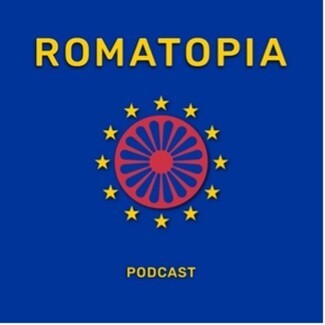ROMATOPIA – Roma talk about their Utopia for Europe

"A new and more generous way of thinking about Roma today would be to admire the Roma's unconventional approach to life for its potential to engender cultural and social innovation"
Artist and curator Daniel Baker (UK) in podcast conversation.
Romatopia is a new podcast in which Roma from twelve countries talk about their lives and their utopia for Europe in twelve episodes. Artists, activists and academics in conversation with hosts William Bila and Isabel Raabe.
Roma are the largest minority in Europe and, spread across all European countries (and beyond) and form a transnational community whose culture is closely interwoven with European cultural history. Their cultural achievements and resilience are often unknown among mainstream societies.
The idea for the podcast "Romatopia - Roma talk about their Utopia for Europe" was born during the Corona pandemic, which is currently challenging European unity and solidarity. In times of crisis, society is quick to look for someone to blame, and often these are the weakest members of society. And so the pandemic, once again, hits Roma hard. At the same time, majority of societies can learn a lot, especially in terms of solidarity and consensus on values in the face of diversity. In this respect, Roma can be seen as avant-garde and role models.
Romatopia presents Roma as role models for the "idea of Europe", not as a problem. Listeners learn about cohesion, about social permeability, about the cultural richness and about transnational unity despite national characteristics. They hear inspiring ideas and future scenarios for Europe. Strong personalities are featured, whose life stories and success stories represent counter-narratives to omnipresent antigypsyism. The podcast shares knowledge, stories and experiences from Roma communities across Europe. Stories of local specificities, personal experiences and traditional knowledge form a transnational narrative that shows a different view of tomorrow's Europe from the perspective of Europe's largest minority.
In this podcast, Paris-based activist William Bila, himself Roma, and Berlin-based curator Isabel Raabe speak with Roma and Sinti from twelve countries. Against their professional and national backgrounds, the guests present their realities of life and their utopias. Among others, artist and curator Daniel Baker (UK) talks about Roma as European avant-garde and about the exhibition "FutuRoma", which he curated for the Roma Pavilion at the Venice Biennale 2019. Sociologist and feminist Ethel Brooks (USA) talks about the strong women in her family, the Holocaust against the Sinti and Roma, and the innovative potential of Roma communities. The artist Selma Selman (Bosnia-Herzegovina) explains how she resists with her art and from Miguel Angel Vargas (Spain) the listeners learn how already in the 18th century "Gitanismo" became a fashion and how Flamenco, which was influenced by the Gitanos (Spanish Roma), became part of the Spanish national culture.
The podcast is designed as a face-to-face conversation with a length of one to one and a half hours. The conversations are conducted predominantly in English, occasionally in German. The conversation develops along biographical stages and private and professional milestones, leaving room for surprising anecdotes on the one hand and well-founded (self-)reflection on the other. The two hosts always relate the perspectives of members of the majority society on the one hand and the Roma community on the other. This search for utopian potential is accompanied by (thought) games and small, surprising tasks that constantly draw the guest out of his or her shell.
The podcast can be heard at:
https://romatopia-podcast.podigee.io/
or at Apple Podcast, Spotify und Deezer:
https://podcasts.apple.com/us/podcast/romatopia-roma-talk-about-their-utopia-for-europe/id1542506328
https://open.spotify.com/show/18hA15XIeAZz46f7JDtjj0
https://www.deezer.com/search/Romatopia
The 12 episodes of the first season
- Daniel Baker, artist, curator, theorist (UK) – released
- Ethel Brooks, Sociologist, Gender Studies (USA) – released
- Zeljko Jovanovic, Open Society Foundation (Serbia/Germany) – released
- Kefaet and Selamet Prizreni, Hip Hop Musicians (Kosovo/Germany) – released
- Selma Selman, artist (Bosnien Herzegowina)
- Miguel Angel Vargas, art historian, actor (Spain)
- Nicoleta Bitu, activist (Rumania)
- Timea Junghaus, art historian, director of the European Roma Institute for Arts and Cultures (Hungary/Germany)
- Sandra and Semonida Selimovic, actors (Austria)
- Lindy Larsson, actor and singer (Sweden)
- Saimir Mile, activist (Albania/France)
- Romani Rose, Chair oft he Central Council of German Sinti and Roma (Germany)
Hosts
William Bila, activist (France/USA)
Isabel Raabe, curator, cultural producer (Germany)
Idea and Concept: Isabel Raabe
Hosts: Isabel Raabe und William Bila
Direction: Katja Lehmann
Sounddesign: Selamet and Kefaet Prizreni
Production: Media Bricks Berlin 2020/2021
Image: Altered States: EU-R © Daniel Baker 2015
Altered States - EU-R is a hybrid design that combines elements of the European Union flag and the Roma flag. The new flags that form the Altered States series re-situate the Roma wheel within the standards of various geographic territories. The harmonious layout of these new flags describe an optimistic scenario of coexistence but at the same time denote the fact that Romani communities have existed within these lands for hundreds of years. As such the new flags simultaneously act as both icons of integration and symbols of resistance.